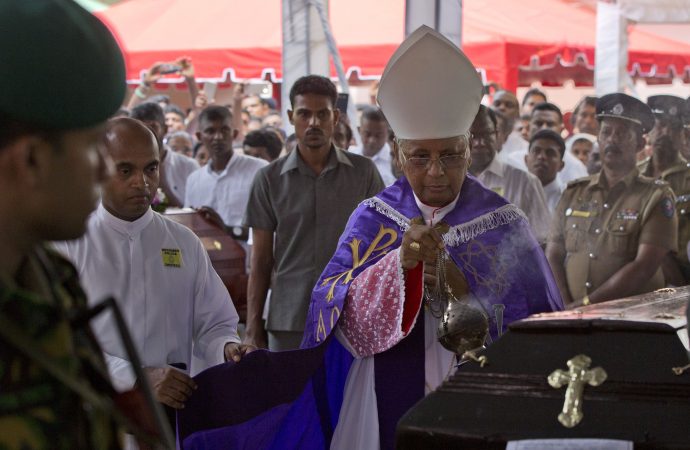In the aftermath of the gruesome and tragic bombings in Sri Lanka Easter Sunday, much of the immediate response for the Catholic community has been raising funds to rebuild the churches and properties that were destroyed.
Yet for Cardinal Malcom Ranjith of Colombo, where Sunday’s attacks took place, his focus is not so much on rebuilding churches but lives.
Speaking of the many people who lost loved ones, or, in some cases, their whole families, Ranjith said, “We have to help these people by a series of counseling programs, because some of them are shattered.”
Though many who suffered loss are surrounded by family and friends offering their support, eventually they will leave, Ranjith said, and survivors “will be left alone to face the reality of loneliness, so we have to help them through programs of counseling.”
Speaking to Crux, Ranjith said the Church will also need to offer other forms of assistance.
In many cases, children have been orphaned, wives and mothers are widowed and childless with no breadwinner, and many suffered injuries requiring lengthy and expensive medical treatment, so “there are certain things that we need to help them with,” Ranjith said, including financial support and education.
Early Easter morning, a total of three churches and three hotels were bombed in Colombo, Sri Lanka, killing some 253 people and wounding close to 500 others.
Two of the churches hit were St. Anthony’s Shrine in Colombo and St. Sebastian’s Church in Negombo, a Catholic majority town north of Colombo. The churches and hotels are in popular tourist areas. An ISIS splinter group has claimed responsibility for the attacks which caused the most devastation in the churches.
Several international charity organizations and even foreign governments have responded, pledging financial support as Catholics on the ground seek to pick up the pieces.
Father Mahendra Gunatilleke, National Director of Caritas Sri Lanka, posted a tweet asking for spiritual and financial assistance, saying, “We seek your prayers and support at this difficult time in our country.”
The United Kingdom branch of the international pontifical charity organization Aid to the Church in Need launched an emergency appeal to support the Christian community in Sri Lanka, and the Knights of Columbus have donated $100,000 to rebuilding efforts.
The Hungarian government through their “Hungary Helps” humanitarian assistance program for persecuted Christians has also pledged their support, offering $31,000 in relief funds for wounded and orphaned children.
In an April 22 tweet, the day after the attacks, Hungary’s Secretary of State Tristan Azbej announced that he had spoken to Ranjith over the phone to discuss further donations. However, no other assistance has yet been announced.
Speaking to Crux, Ranjith said that “everybody is shattered” by the attacks, because they happened “so suddenly and out of the blue without any information whatsoever, and therefore many people were killed who were caught unaware.”
“They went for Sunday Mass, Easter Sunday, and they got blown to bits … the whole nation is suffering,” he said.
Ranjith, who visited the churches after the attacks and who has presided over several funerals of victims this week, said he has found it difficult to console people.
“It is not an easy thing to comfort people who have lost their loved ones in large numbers,” he said, noting that Thursday morning he presided over the funeral of a husband and wife whose children are now orphaned.
Earlier in the week he presided over the funeral of a man and his two children, and whose wife is now alone with “no one to look after her.” Prior to that, he buried a mother and her three children whose husband is now alone.
“‘Terrible’ is not the word,” Ranjith said, explaining that he tries to attend as many funerals as he can, but “they are so numerous” that he can’t go to all of them and depends on his auxiliary bishops and priests.
Asked if he believes the attacks will spark greater religious tensions in Sri Lanka, Ranjith said the bombings were not a matter of religion but “a question of terrorism, that’s all.”
“People who do these things are not people who believe in religion. If they believed in religion, they would not lay their hands on one single person.”
Sri Lanka is a majority Buddhist nation, comprising some 70 percent of the country’s population of 21 million, while 13 percent are Hindus and 10 percent Christians.
Ranjith said people were surprised that extremists would attack Sri Lanka, insisting “we had no reason to be attacked.”
“We didn’t do any harm to ISIS, we didn’t go and fight them, so why they did this to our innocent people?” he said. “We cannot understand why they did these horrible things to innocent people who never raised a gun or anything against them.”
In the wake of the attacks, many people are pushing for a full inquiry into who’s responsible and their possible motivations, as well as the government’s handling of the issue since some officials had been warned by India at the beginning of April of a planned attack.
“We were kept in the dark about this, and suddenly this happened, making life so miserable for so many people,” Ranjith said, adding that “it is really something unethical and unacceptable.”
However, while he will continue to press the government for answers, Ranjith’s priority is to be there for his people. Where words fall short, gestures are the only comfort he’s able to give.
“I like to be with them, I like to console them, I like to caress them, I like to be a person who gives them strength,” he said, saying his message is to not give up but to keep going forward “in spite of the serious crisis.”
Ranjith said he tries to encourage children who lost their parents to “carry on, sowing their parents’ good name by doing what they have to do as good Christians. I want them to take it up courageously and move forward with their lives.”

